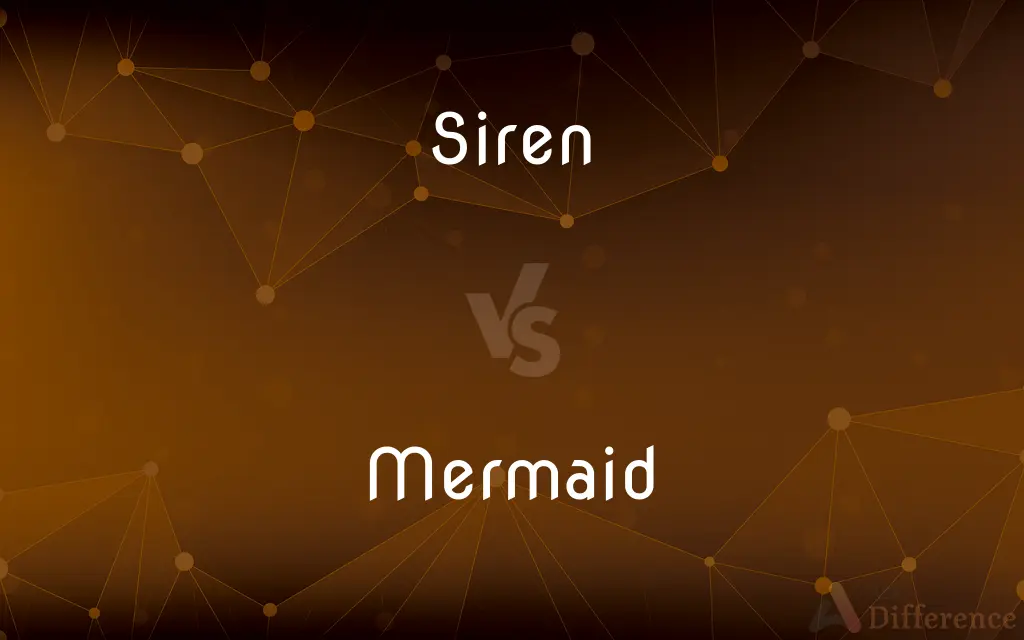Siren vs. Mermaid — What's the Difference?
Edited by Tayyaba Rehman — By Fiza Rafique — Updated on October 30, 2023
"Siren" traditionally refers to mythological creatures known for their singing to lure sailors, while "Mermaid" is a half-human, half-fish being from folklore.

Difference Between Siren and Mermaid
Table of Contents
ADVERTISEMENT
Key Differences
"Siren" originates from Greek mythology, where these creatures, often depicted with bird-like features, would sing enchanting songs to lead sailors astray, causing shipwrecks. In contrast, "Mermaids," with their human upper bodies and fish tails, are staples in various cultures' folklores, often linked with beauty and allure.
While "Sirens" are primarily known for their mesmerizing voices that spell doom, "Mermaids" have a broader range of stories, from enchanting sea folk to protectors of oceans or even beings who fall in love with humans.
Interestingly, the modern depiction of "Sirens" sometimes merges with that of "Mermaids," causing confusion. Traditional "Sirens" had bird elements, whereas "Mermaids" consistently appear as half-fish beings.
In literature and art, "Sirens" often symbolize temptation and danger. "Mermaids," however, are more versatile, symbolizing mystery, beauty, freedom, or danger, depending on the story.
Many tales caution sailors about the seductive power of "Sirens," advising them to resist their enchanting melodies. Meanwhile, "Mermaids" appear in a variety of narratives, from tragic love stories to tales of them rescuing or befriending humans.
ADVERTISEMENT
Comparison Chart
Origin
Greek mythology
Various global folklores
Typical Depiction
Often with bird-like features
Half-human, half-fish
Primary Attribute
Enchanting song causing shipwrecks
Beauty and allure
Common Associations
Temptation and danger
Mystery, beauty, freedom, or danger
Modern Interpretation
Sometimes conflated with mermaids
Often seen as benign, but some stories depict them as dangerous
Compare with Definitions
Siren
Often depicted with bird-like features.
Ancient pottery showed Sirens with wings and talons.
Mermaid
Featured in various global myths and legends.
Mermaids are celebrated in festivals around coastal towns.
Siren
A symbol of temptation and danger.
Like a Siren's call, the treasure tempted many adventurers.
Mermaid
A mythical being with a human upper body and a fish tail.
Children stared in awe at the Mermaid statue.
Siren
A device producing loud sounds for warnings.
The tornado siren echoed throughout the town.
Mermaid
Often linked to tales of oceanic allure and beauty.
The sailor spoke of a beautiful Mermaid he saw during his voyage.
Siren
Sometimes conflated with mermaids in modern times.
In the movie, the Siren looked more like a traditional mermaid.
Mermaid
Sometimes depicted as protectors of the sea.
The local legend spoke of a Mermaid who saved sailors from storms.
Siren
Greek Mythology One of a group of sea nymphs who by their sweet singing lured mariners to destruction on the rocks surrounding their island.
Mermaid
Subject of numerous artistic and literary works.
The painting captured a Mermaid's ethereal beauty against a moonlit sea.
Siren
Siren A woman regarded as irresistibly alluring.
Mermaid
In folklore, a mermaid is an aquatic creature with the head and upper body of a female human and the tail of a fish. Mermaids appear in the folklore of many cultures worldwide, including Europe, Asia, and Africa.
Siren
A device in which compressed air or steam is driven against a rotating perforated disk to create a loud, often wailing sound as a signal or warning.
Mermaid
A legendary sea creature having the head and upper body of a woman and the tail of a fish.
Siren
An electronic device producing a similar sound as a signal or warning
A police car siren.
Mermaid
A mythological Category:en:Mythological_creatures creature with a woman's head and upper body, and a tail of a fish.
Siren
Any of several slender aquatic salamanders of the family Sirenidae of eastern North America, having external gills, small forelimbs, and no hind limbs.
Mermaid
Coloured a brilliant turquoise.
Mermaid smoothie
Siren
(Greek mythology) One of a group of nymphs who lured mariners to their death on the rocks.
Mermaid
(obsolete) A prostitute.
Siren
One who sings sweetly and charms.
Mermaid
A fabled marine creature, typically represented as having the upper part like that of a woman, and the lower like a fish; a sea nymph, sea woman, or woman fish.
Siren
A dangerously seductive woman.
Mermaid
Half woman and half fish; lives in the sea
Siren
(biology) A member of an order of mammals of Sirenia.
Siren
(biology) A member of a genus of aquatic salamanders of the family Sirenidae, commonly used for all species subsumed under the family of Sirenidae.
Siren
(entomology) Any of various nymphalid butterflies of the genus Hestina.
Siren
A device, either mechanical or electronic, that makes a piercingly loud sound as an alarm or signal, or the sound from such a device (first recorded 1879).
Siren
(music) A musical instrument, one of the few aerophones in the percussion section of the symphony orchestra (patented as Acme Siren in 1895).
Siren
An instrument for demonstrating the laws of beats and combination tones.
Siren
An astrophysical event that can be used for calculating cosmic distances.
Siren
To make a noise with, or as if with, a siren.
Siren
Relating to or like a siren.
Siren
One of three sea nymphs, - or, according to some writers, of two, - said to frequent an island near the coast of Italy, and to sing with such sweetness that they lured mariners to destruction.
Next where the sirens dwell you plow the seas;Their song is death, and makes destruction please.
Siren
An enticing, dangerous woman.
Siren
Something which is insidious or deceptive.
Consumption is a siren.
Siren
A mermaid.
Siren
Any long, slender amphibian of the genus Siren or family Sirenidæ, destitute of hind legs and pelvis, and having permanent external gills as well as lungs. They inhabit the swamps, lagoons, and ditches of the Southern United States. The more common species (Siren lacertina) is dull lead-gray in color, and becames two feet long.
Siren
An instrument for producing musical tones and for ascertaining the number of sound waves or vibrations per second which produce a note of a given pitch. The sounds are produced by a perforated rotating disk or disks. A form with two disks operated by steam or highly compressed air is used sounding an alarm to vessels in fog.
Siren
Of or pertaining to a siren; bewitching, like a siren; fascinating; alluring; as, a siren song.
Siren
A sea nymph (part woman and part bird) supposed to lure sailors to destruction on the rocks where the nymphs lived;
Odysseus ordered his crew to plug their ears so they would not hear the Siren's fatal song
Siren
A woman who is considered to be dangerously seductive
Siren
A warning signal that is a loud wailing sound
Siren
An acoustic device producing a loud often wailing sound as a signal or warning
Siren
Eel-like aquatic North American salamander with small forelimbs and no hind limbs; have permanent external gills
Siren
A creature from Greek mythology with a captivating song.
The sailors couldn't resist the Siren's enchanting melody.
Common Curiosities
Are there male "Mermaids"?
Yes, they're typically called "Mermen."
Were "Sirens" always associated with the sea?
Originally, they weren't strictly sea creatures; the association came over time.
Are "Sirens" always female?
In most myths, yes, Sirens are depicted as female.
Where did the "Siren" myth originate?
Sirens have their roots in ancient Greek mythology.
Are "Sirens" and "Mermaids" considered deities?
They're mythological creatures, but not typically revered as gods.
Do "Mermaids" have any supernatural powers?
Folklore varies, but some attribute magic or prophetic abilities to Mermaids.
Do "Mermaids" sing like "Sirens"?
Some tales attribute singing to Mermaids, but it's Sirens who are specifically known for their enchanting songs.
Can "Mermaids" live on land?
In many stories, they can be on land temporarily but must return to the water.
Do "Sirens" have a specific song?
Myth doesn't specify a particular song, just that it's irresistibly enchanting.
Are there positive depictions of "Sirens"?
While mostly portrayed as dangerous, some modern interpretations show them more neutrally or sympathetically.
Why do some modern stories mix "Sirens" and "Mermaids"?
Over time, distinctions blurred, especially as sea-based tales of both became popular.
Are "Mermaids" always friendly in myths?
Depictions vary; they can be friendly, indifferent, or even dangerous.
How have "Siren" and "Mermaid" myths influenced modern culture?
They've inspired movies, books, songs, and even fashion.
What's a popular work featuring "Mermaids"?
Hans Christian Andersen's "The Little Mermaid" is a famous story.
Are there "Mermaid" sightings in modern times?
There are occasional claims, but no verifiable evidence.
Share Your Discovery

Previous Comparison
Giggle vs. Smile
Next Comparison
Inboard vs. OnboardAuthor Spotlight
Written by
Fiza RafiqueFiza Rafique is a skilled content writer at AskDifference.com, where she meticulously refines and enhances written pieces. Drawing from her vast editorial expertise, Fiza ensures clarity, accuracy, and precision in every article. Passionate about language, she continually seeks to elevate the quality of content for readers worldwide.
Edited by
Tayyaba RehmanTayyaba Rehman is a distinguished writer, currently serving as a primary contributor to askdifference.com. As a researcher in semantics and etymology, Tayyaba's passion for the complexity of languages and their distinctions has found a perfect home on the platform. Tayyaba delves into the intricacies of language, distinguishing between commonly confused words and phrases, thereby providing clarity for readers worldwide.
















































